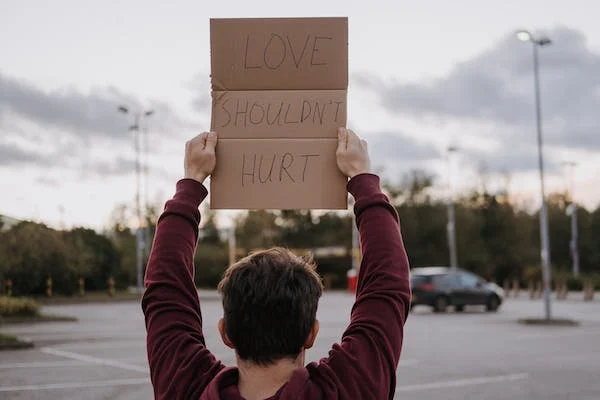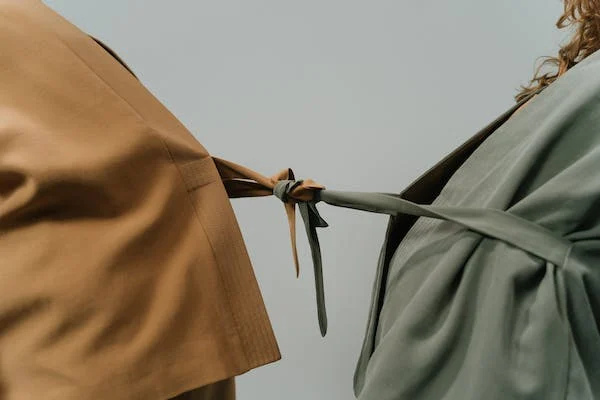Last Updated on May 2, 2024 by Daniele Lima
Learn how to get out of a toxic/abusive relationship and conquer a path to freedom
Anyone who has been through an abusive relationship knows that you enter without realizing the damage and that leaving is an extremely difficult task. The damage can be both physical and psychological, causing serious disorders.
Those who are victims of this type of relationship have their self-esteem affected and tend to isolate themselves socially, living solely for the sake of others. There are more serious cases in which, in addition to emotional violence, physical aggression also occurs.
However, although difficult, it is totally possible to break free from a toxic and selfish relationship where only one benefits from the other. For this to happen, it is necessary to break the chain to walk a healthy path, with freedom and self-love. In this article, we are going to talk about some steps that you can take in your favor, to get out of this vicious cycle that disguises itself as a relationship.
Table of Contents
1 – Acknowledge the situation
The first step to ending an abusive relationship is admitting that you are in one. This will not always be a simple task, as recognizing that you have a very serious problem and that you need help can be embarrassing and disappointing for most people. Admitting that someone you love and trust is hurting you is difficult, but denial only prolongs the pain.
It is important to educate yourself about the different types of abuse and to be aware of warning signs such as excessive control, physical or verbal abuse, emotional manipulation, and social isolation. By accepting the situation, you open the door to positive changes in your life.
2 – Seek support

If you realize you’re in an abusive relation, it’s important to seek support. Talking about your situation with trusted friends, family, or trained professionals such as therapists or counselors can be an important first step in getting the emotional support you need.
These people can help you realize that you are not alone and that there is a way out. In addition, they can provide practical guidance on how to handle the situation, document abuse, and create a safety plan.
Seeking group therapy, where you will have contact with other people who are going through the same dilemma, but who have already started to break through the difficulties, due to the exchange of experiences and learning, can also be a great option.
3 – Set boundaries and positive affirmations
In an abusive relationship, boundaries are often crossed and self-esteem is eroded. It’s important to set clear boundaries and communicate these to your abusive partner. These restrictions must include unacceptable behavior that you will not tolerate.
It’s also important to develop positive affirmations to boost your confidence and restore your self-esteem. Remember that you deserve love, respect, and security. Repeat these affirmations to yourself regularly and believe them.
Don’t forget that you have the power to set your limits and accept only what’s good for you and what adds to you as a person. Positive speech is very important in this process, especially with yourself. Believe and affirm that you deserve respect, and never give it up.
4 – Create a security plan

If you decide to leave an abusive relationship, it’s important to have a backup plan in place. This might include identifying safe places to go, such as a friend’s house or a domestic violence shelter.
Having a clear plan helps minimize risks and increases the feeling of control over the situation. Make sure you have access to important documents like ID and financial documents in a safe place. Contacting local support organizations can be an additional step to help and guide you through this process.
The most important thing is not to fail to take some action in your favor, out of fear, associated with a lack of strategy and planning.
5 – Make a decision and move on
The last step to ending an abusive relationships is to make a final decision and move on. After acknowledging the situation, seeking support, setting boundaries, and drawing up a safety plan, the decisive moment comes to make the decision to end the abusive relationship and move on with your life.
This decision can be very difficult and painful, especially if there is emotional dependence or fear of possible consequences. However, remember that you have the right to live a healthy and abuse-free life. Don’t forget the damage an abusive relationship does to you and the people around you, use this as motivation to make the decision to leave.
6 – Educate yourself about healthy relationships
When leaving an abusive relationship, it’s important to educate yourself about healthy relationships. Learn the fundamentals of a healthy relationship, including open and respectful communication, equality, mutual support, and the importance of consent. This will help strengthen your understanding of what constitutes a healthy relationship and prevent future abuse.
It is normal at first to believe that it is difficult for you to have a completely opposite type of relation from the previous one, with love and respect above all else, but believe that it is totally possible. Therefore, working on self-knowledge and self-love is extremely important to prepare you for the next healthy relationship, where you will be respected as a person.
7 – Cultivate resilience and gratitude
Ending an abusive relationship is a difficult journey and requires determination. Build that resilience by facing your fears, overcoming obstacles, and learning from past experiences.
Also, practice gratitude every day by focusing on the things good in your life and celebrating your progress. Gratitude helps strengthen your positive outlook and reminds you that there is hope and happiness beyond the abuse.
It’s really good to see everything you went through as experience and learning, which made you a wiser person and ready to make better decisions in the future.
Conclusion:
In short, to get out of an abusive relationship, your will is needed first. From the moment you identify the problem and decide to leave, the whole process begins. Emotional support, setting limits, positive affirmations, getting to know yourself and getting ready to live something new, and being resilient and grateful, are miraculous steps, capable of changing your story for the better.
This process is not covered in an accelerated way, respect the natural course of events, because that’s life, everything in its own time. No one is like anyone else, each case will have a unique time and outcome, and I’m glad that’s how it is!
Cherish each of your achievements during the process, celebrate, and understand that it is very likely that you will be the next person to help someone in this regard in the future, based on your own experience.
Abusive Relationship – FAQ:
Why are abusive relationships hard to leave
Toxic relationships are difficult to leave due to various psychological and emotional factors. Victims of abuse often experience a range of emotions, including fear, guilt, shame, and dependency, which can create a sense of entrapment.
Additionally, abusers often employ manipulation tactics such as gaslighting and love bombing to maintain control over their victims, making it challenging for them to recognize the toxicity of the relationship.
Moreover, there may be financial or logistical barriers that prevent individuals from leaving, such as a lack of resources or fear of retaliation. Over time, victims may develop a distorted perception of reality and internalize the abusive behavior, further complicating the decision to leave.
Can abusive relationships be fixed
Toxic relationships are characterized by patterns of abuse, manipulation, and dysfunction, making them unlikely to be fixed through conventional means. Attempting to salvage toxic relations often perpetuates the cycle of abuse and prolongs the suffering of the victim.
While couples therapy or counseling may be beneficial in some cases, it typically requires the willingness of both parties to acknowledge the issues and actively work towards change.
However, in many toxic relations, the abuser may be unwilling or unable to take responsibility for their actions, making reconciliation unlikely. In such cases, prioritizing self-care and seeking support to leave the toxic relationship is essential for healing and moving forward.
What causes abusive relationships
Toxic relationships can stem from various underlying factors, including individual psychological issues, past traumas, and dysfunctional relationship dynamics. Abusers may have unresolved anger, insecurity, or control issues that contribute to their abusive behavior.
Similarly, victims of abuse may have a history of trauma or low self-esteem that makes them vulnerable to manipulation and mistreatment. In some cases, societal or cultural norms that perpetuate power imbalances and gender roles may also contribute to the development of toxic relationships.
Ultimately, toxic relationships thrive in environments where there is a lack of healthy communication, boundaries, and mutual respect, allowing abusive patterns to persist unchecked.
How abusive relationships affect you
Toxic relationships can have profound and lasting effects on individuals’ mental, emotional, and physical well-being. Victims of abuse may experience a range of negative outcomes, including anxiety, depression, post-traumatic stress disorder (PTSD), and low self-esteem.
The constant stress and fear associated with toxic relations can also manifest in physical symptoms such as headaches, insomnia, and digestive issues.
Moreover, toxic relations often isolate victims from their support networks, further exacerbating feelings of loneliness and helplessness. Over time, the cumulative impact of abuse can erode one’s sense of identity, autonomy, and worth, making it difficult to break free from the cycle of abuse.










Leave a Reply